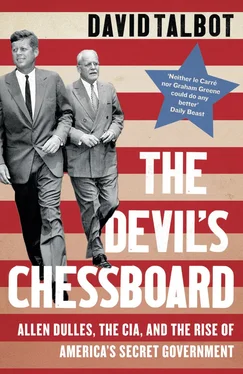By siccing men like William O. Douglas on men like John Foster Dulles, President Roosevelt drove the plutocracy mad. J. P. Morgan Jr. was so incensed by the “class traitor” FDR that his servants had to cut out the president’s picture from the Wall Street titan’s morning newspaper for fear that it would spike his blood pressure. The class hatred against Roosevelt even resulted in at least two abortive coupsagainst his presidency. In 1934, a group of Wall Street plotters—financed by wealthy Roosevelt enemies (and Dulles clients) like the Du Ponts—tried to recruit Marine war hero General Smedley Butler to lead an armed march on Washington. In 1940, newspaperman and socialite Cornelius Vanderbilt Jr.—one of FDR’s few friends in the New York club set—tipped off Eleanor Rooseveltto another anti-Roosevelt plot he had heard being hatched in his Fifth Avenue circles, involving tycoons as well as army officers.
The First Lady was among those who wondered about the wisdom of allowing someone like Allen Dulles to set up spy operations in war-torn Europe, where he was certain to open lines of communication to Nazi interests. But Dulles was not the only master chess player involved in this high-stakes game. FDR apparently had his own reason for allowing Dulles to establish himself in Bern. “ He was a dangle,” said John Loftus, a former Nazi war crimes investigator for the U.S. Justice Department. “The White House wanted Dulles in clear contact with his Nazi clients so they could be easily identified.”
One of Dulles’s most important contacts in Europe was Thomas McKittrick, an old Wall Street friend who was president of the Bank for International Settlements. BIS had been created by the world’s leading central banks to administer German reparations payments after World War I, but it soon took on a life of its own, transforming itself into a pillar of the emerging global financial system. Lodged in a former hotel next to a chocolate shop in Basel, Switzerland, BIS was so secretive that nobody was permitted to peer inside its boardroom, even when it was empty. By 1940, when McKittrick arrived in Switzerland to oversee the bank, it was effectively controlled by Hitler’s regime. Five of its directors would later be charged with war crimes, including Hermann Schmitz, the CEO of IG Farben, the chemical conglomerate that became notorious for its production of Zyklon B, the gas used in Hitler’s death camps, and for its extensive use of slave labor during the war.
Schmitz was one of the many Dulles brothers’ law clients and business associates who were involved with BIS. It was a close-knit circle of men whose relationships smoothly weathered the storms of war. Even as his company was stockpiling poison for Hitler’s exterminators, Schmitz would send cheery Christmas and birthday greetings to his American business friends.
The secretive BIS became a crucial financial partnerfor the Nazis. Emil Puhl—vice president of Hitler’s Reichsbank and a close associate of McKittrick—once called BIS the Reichsbank’s only “foreign branch.” BIS laundered hundreds of millions of dollars in Nazi gold looted from the treasuries of occupied countries. Some of the gold was torn from the mouths of concentration camp victims or melted down from Jewish families’ candleholders, cigarette cases, and other personal belongings.
Dulles connected with McKittrick as soon as he set foot in Europe, meeting with the BIS president in Lisbon, even before he reached Switzerland. McKittrick, a well-tailored, pink-cheeked man with a high-domed forehead and prematurely snowy hair, later described the meeting as a happy coincidence. But both men were clearly eager to talk business. As soon as he walked into the lobby of his Lisbon hotel, the banker recalled, “ Somebody grabbed me frombehind and said, ‘Is that you Tom McKittrick? Well, my gosh, I’ve got to see you. You’re the first man I wanted to see in Switzerland.’ And it was Allen Dulles, on his way over [to his OSS station in Bern].” The two men stayed up all night at the hotel, in deep conversation, until McKittrick had to leave for his five o’clock plane.
Dulles was eager to pump McKittrick for inside information about the Reich, since the banker had good connections in Berlin. But the two men also wanted to discuss another issue that was of paramount concern to both of them: how to protect the assets of their German and American corporate clients in the tumultuous war climate.
Like Dulles, McKittrick was not popular with Roosevelt and his inner circle. FDR’s Treasury secretary, Henry Morgenthau Jr., developed a deep loathing for McKittrick, whom Morgenthau’s aide, Harry Dexter White, called “an American [bank] president doing business with the Germanswhile our American boys are fighting the Germans.” The Roosevelt administration moved to block BIS funds in the United States, but McKittrick hired Foster Dulles as legal counsel, who successfully intervened on the bank’s behalf.
Morgenthau was outraged when McKittrick made a business trip to the United States in winter 1942 and was warmly feted by Wall Street. Dozens of powerful financiers and industrialists—including the executives of several corporations, such as General Motors and Standard Oil, that had profited handsomely from doing business with the Nazis—gathered for a banquet in McKittrick’s honor at New York’s University Club on December 17.
Morgenthau tried to prevent McKittrick from returning to BIS headquarters in Switzerland on the grounds that the bank was clearly aiding the Nazi war effort. The banker later sniffed about the “ nasty crew in the Treasuryat the time … I was very suspect because I talked to Italians and talked to Germans—and I said that they had behaved very well. I [refused to denounce them as] villains of the worst sort.” Allen Dulles came to McKittrick’s rescue, deftly pulling strings on the banker’s behalf, and in April 1943 he finally boarded a transatlantic flight to Europe.
Dulles and McKittrick continued to work closely together for the rest of the war. In the final months of the conflict, the two men collaborated against a Roosevelt operation called Project Safehaven that sought to track downand confiscate Nazi assets that were stashed in neutral countries. Administration officials feared that, by hiding their ill-gotten wealth, members of the German elite planned to bide their time after the war and would then try to regain power. Morgenthau’s Treasury Department team, which spearheaded Project Safehaven, reached out to the OSS and BIS for assistance. But Dulles and McKittrick were more inclined to protect their clients’ interests. Moreover, like many in the upper echelons of U.S. finance and national security, Dulles believed that a good number of these powerful German figures should be returned to postwar power, to ensure that Germany would be a strong bulwark against the Soviet Union. And during the Cold War, he would be more intent on using Nazi loot to finance covert anti-Soviet operations than on returning it to the families of Hitler’s victims.
Dulles realized that none of his arguments against Project Safehaven would be well received by Morgenthau. So he resorted to time-honored methods of bureaucratic stalling and sabotage to help sink the operation, explaining in a December 1944 memo to his OSS superiors that his Bern office lacked “ adequate personnelto do [an] effective job in this field and meet other demands.”
McKittrick demonstrated equal disdain for the project, and his lack of cooperation proved particularly damaging to the operation, since BIS was the main conduit for the passage of Nazi gold. “The Treasury [Department] kept sending sleuth houndsover to Switzerland,” he complained years later. “The only thing they were interested in was where was Hitler putting his money, and where [Hermann] Goering was putting his money, and [Heinrich] Himmler, and all the rest of the big boys in Germany. But I, myself, am convinced that those fellows were not piling up money for the future.”
Читать дальше











